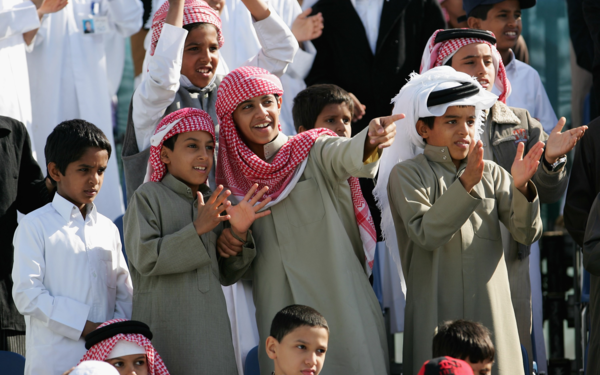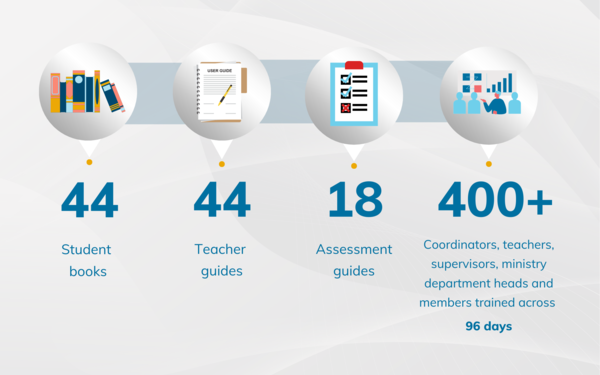Helping to bring Qatar’s science curriculum to life in the classroom
We collaborated in the development of new teaching materials, teacher training and professional development to support a new science curriculum in Qatar.

Quick read
- In 2019, we began working with the Qatari Ministry of Education and Higher Education and other local partners to develop new teaching, learning and assessment materials in Arabic for grades 1-9 and to translate the teaching and learning resources of grades 10-12.
We also developed and delivered teacher training workshops for grades 1-9 to ensure the successful introduction of the resources.
Bringing a new science curriculum to life
Qatar aims to build an education system that embeds modern international standards and is comparable with the best education systems in the world - while preserving Islamic values and Qatari culture.
The Qatari Ministry of Education and Higher Education (the Ministry) frames this ambition as a paradigm shift, with students developing skills and competencies alongside subject knowledge.
In 2016, the Ministry developed the general framework for the national education curriculum, and in 2018, it revised the science curriculum.
Qatar needed partners to bring this new curriculum to life; to develop science learning materials and train teachers on how to use the books effectively.
Cambridge’s role in the partnership
The Ministry chose to work with us on this project in 2019, alongside our local partner Techno Lab, who are specialists in conceiving and designing learning solutions for education in Qatar.
At Cambridge, we have deep expertise in working with partners in the Middle East and beyond to publish high quality teaching and learning resources: we collaborate with leading teachers, researchers, and content creators to produce materials for classrooms in more than 170 countries around the world.
As with all of our projects, designing teaching and learning materials for Qatar involved working with our partners to ensure we reflected their curriculum, cultural context, and wider education system. We also considered available classroom resources, teacher readiness, and key stakeholders who might be engaged with the education programme through the materials.
In 2019, we began to develop student books, teacher’s guides and assessment guides. Our team of experts worked with regional specialists to achieve the balance of international standards and local relevance.
We also worked closely with our partners to develop and deliver a custom-designed teacher training programme to support teachers in understanding the new pedagogical approach and textbooks. This was intended to ensure that books are tied into teaching strategies and the approaches in the curriculum are reinforced.
Once training began, we gathered regular feedback to enable iterative improvements in the sessions and understand their impact on the teachers' professional development. This was especially important as, due to the Covid pandemic, training needed to take place in a virtual environment.
Engaging with teachers was essential to the successful development of this professional development programme. We conducted a survey to assess the impact of the training delivered to coordinators on teachers’ practices in the classroom. We also visited local schools to communicate directly with teachers about their practice.
We also worked with the Ministry to revise the books to create first and second editions. Our approach has been for the full ownership of the materials to pass to the Ministry, so iterative updates can be made locally to further embed and strengthen effective practice in the classroom.
After an initial three year project, we agreed to a further year of work to deliver assessment guides and a review of the books, which was completed in 2022.
The deliverables in summary:
- Authoring of the National Science Student Books from grades 1-9, with the teacher resources.
- Authoring assessment guides from grades 1-9.
- Translation into Arabic of the national biology, physics, chemistry, general science and earth science student books and teacher resources for grades 10-12.
- Training the coordinators on how to use the published books effectively and support cascading of the training to teachers in schools.
A review of the books, as part of a one year extension to our existing three year project.
Results and impact

We’re happy to report that feedback from the new teaching and learning materials and training provided has been very positive.
After the first phase of teacher training, our survey on the effect of the training on teaching practices in Qatar found that 93% of participants found the teacher training courses supportive in their daily work to ensure better student results and involvement in learning.
We have also had positive feedback from curriculum experts we worked with at the Qatari Ministry of Education and Higher Education. Mohammed Abdel Fattah said:
“The training workshops provided by Cambridge have been well received by all parties . We noticed a great interaction between the subjects and teachers…the participants were eagerly awaiting their turn to take part in the training.”
Tarek Zuainat added that the strategies and methods teachers had learned through the training sessions “had great impact on communicating educational materials to students”. He added: “New teaching sources and modern training methods have developed students' inquisitive and research capabilities, and their abilities to take part in international research and competitions.”
Our work on the project was done in close collaboration with local partners including Techno Lab. They said: “We value our partnership with Cambridge. We created a long-term relationship based on mutual respect and trust for everyone involved, including the Ministry teams.”
“Our biggest achievement on this project was the training. Although it was the most challenging part, since it was suddenly shifted from face-to-face into remote training because of Covid, we were evaluated by the Ministry and the teachers as providing the most successful training in the country.”
We also visited schools to see the impact for ourselves. Fatima Fadlallah, project manager at Cambridge Partnership for Education, who has worked on the project since the beginning, says: “I feel proud at what we achieved together with our partners. I’ve been into classes and watched students, working with the books and interacting with teachers. I can see that the work we’ve delivered together has really made a difference, corresponding to their needs.”
If you want to find out more about our services, or how we can help, please get in touch.
